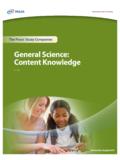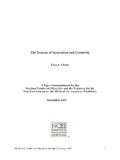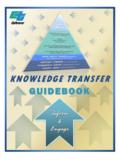Transcription of Sources of Knowledge - Weebly
1 Social scientist, you must be aware of each of these methods. Let s look 6 CHAPTER 1 Sources of KnowledgeThere are many ways to gain Knowledge , and some are better than others. As at several ways of acquiring Knowledge , beginning with Sources that may not be as reliable or accurate as scientists might desire. We will then consider Sources that offer greater reliability and ultimately discuss using science as a means of gaining and IntuitionGaining Knowledge via superstition means acquiring Knowledge that is based on subjective feelings, interpreting random events as nonrandom events, or believing in magical events.
2 For example, you may have heard someone say Bad things happen in threes. Where does this idea come from? As far as I know, no study has ever documented that bad events occur in threes, yet people frequently say this and act as if they believe it. Some people believe that breaking a mirror brings 7 years of bad luck or that the number 13 is unlucky. Once again, these are examples of supersti-tious beliefs that are not based on observation or hypothesis testing. As such, they represent a means of gaining Knowledge that is neither reliable nor we gain Knowledge via intuition, it means that we have Knowledge of something without being consciously aware of where the Knowledge came from.
3 You have probably heard people say things like I don t know, it s just a gut feeling or I don t know, it just came to me, and I know it s true. These statements represent examples of intuition. Sometimes we intuit something based not on a gut feeling but on events we have observed. The problem is that the events may be misinterpreted and not representative of all events in that category. For example, many people believe that more babies are born during a full moon or that couples who have adopted a baby are more likely to conceive after the adoption. These are examples of illusory correlation the perception of a relationship that does not exist.
4 More babies are not born when the moon is full, nor are couples more likely to conceive after adopting (Gilovich, 1991). Instead, we are more likely to notice and pay attention to those couples who conceive after adopting, and not notice those who did not conceive after via superstitionKnowledge that is based on subjective feelings, interpreting random events as nonrandom events, or believing in magical via superstitionKnowledge that is based on subjective feelings, interpreting random events as nonrandom events, or believing in magical via intuitionKnowledge gained without being consciously aware of its via intuitionKnowledge gained without being consciously aware of its 62/1/08 1:04.
5 03 PMThinking Like a Scientist 7 AuthorityWhen we accept what a respected or famous person tells us, we are gaining Knowledge via authority. You may have gained much of your own knowl-edge through authority figures. As you were growing up, your parents provided you with information that, for the most part, you did not question, especially when you were very young. You believed that they knew what they were talking about, and thus you accepted the answers they gave you. You have probably also gained Knowledge from teachers whom you viewed as authority figures, at times blindly accepting what they said as truth. Most people tend to accept information imparted by those they view as author-ity figures.
6 Historically, authority figures have been a primary means of information. For example, in some time periods and cultures, the church and its leaders were responsible for providing much of the Knowledge that individuals gained throughout the course of their today, many individuals gain much of their Knowledge from author-ity figures. This may not be a problem if the perceived authority figure truly is an authority on the subject. However, problems may arise in situations where the perceived authority figure really is not knowledgeable about the material he or she is imparting. A good example is the information given in infomer-cials.
7 Celebrities are often used to deliver the message or a testimonial con-cerning a product. For example, Cindy Crawford may tell us about a makeup product, or Christie Brinkley may provide a testimonial regarding a piece of gym equipment. Does Cindy Crawford have a degree in dermatology? What does Christie Brinkley know about exercise physiology? These individuals may be experts on acting or modeling, but they are not authorities on the prod-ucts they are advertising. Yet many individuals readily accept what they conclusion, accepting the word of an authority figure may be a reli-able and valid means of gaining Knowledge , but only if the individual is truly an authority on the subject.
8 Thus, we need to question authoritative Sources of Knowledge and develop an attitude of skepticism so that we do not blindly accept whatever is presented to Knowledge via tenacity involves hearing a piece of information so often that you begin to believe it is true, and then, despite evidence to the contrary, you cling stubbornly to the belief. This method is often used in political campaigns, where a particular slogan is repeated so often that we begin to believe it. Advertisers also use the method of tenacity by repeat-ing their slogan for a certain product over and over until people begin to associate the slogan with the product and believe that the product meets its claims.
9 For example, the makers of Visine advertised for over 40 years that It gets the red out, and, although Visine recently changed the slogan, most of us have heard the original so many times that we probably now believe it. The problem with gaining Knowledge through tenacity is that we do not know whether the claims are true. As far as we know, the accuracy of such Knowledge may not have been evaluated in any valid way. Knowledge via authorityKnowledge gained from those viewed as authority via authorityKnowledge gained from those viewed as authority via tenacityKnowledge gained from repeated ideas that are stubbornly clung to despite evidence to the via tenacityKnowledge gained from repeated ideas that are stubbornly clung to despite evidence to the 72/1/08 1:04:04 PM8 CHAPTER 1 RationalismGaining Knowledge via rationalism involves logical reasoning.
10 With this approach, ideas are precisely stated and logical rules are applied to arrive at a logically sound conclusion. Rational ideas are often presented in the form of a syllogism. For example:All humans are mortal;I am a human;Therefore, I am conclusion is logically derived from the major and minor premises in the syllogism. Consider, however, the following syllogism:Attractive people are good;Nellie is attractive;Therefore, Nellie is syllogism should identify for you the problem with gaining knowl-edge by logic. Although the syllogism is logically sound, the content of both premises is not necessarily true. If the content of the premises were true, then the conclusion would be true in addition to being logically sound.










